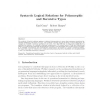Free Online Productivity Tools
i2Speak
i2Symbol
i2OCR
iTex2Img
iWeb2Print
iWeb2Shot
i2Type
iPdf2Split
iPdf2Merge
i2Bopomofo
i2Arabic
i2Style
i2Image
i2PDF
iLatex2Rtf
Sci2ools
107
click to vote
ENTCS
2007
2007
Syntactic Logical Relations for Polymorphic and Recursive Types
The method of logical relations assigns a relational interpretation to types that expresses operational invariants satisfied by all terms of a type. The method is widely used in the study of typed languages, for example to establish contextual equivalences of terms. The chief difficulty in using logical relations is to establish the existence of a suitable relational interpretation. We extend work of Pitts and Birkedal and Harper on constructing relational interpretations of types to polymorphism and recursive types, and apply it to establish parametricity and representation independence properties in a purely operational setting. We argue that, once the existence of a relational interpretation has been established, it is straightforward to use it to establish properties of interest.
Related Content
| Added | 13 Dec 2010 |
| Updated | 13 Dec 2010 |
| Type | Journal |
| Year | 2007 |
| Where | ENTCS |
| Authors | Karl Crary, Robert Harper |
Comments (0)

